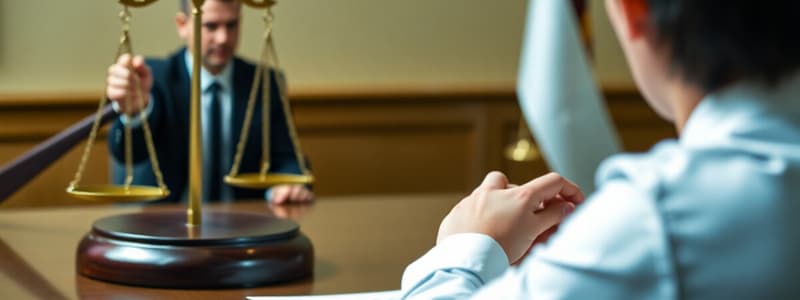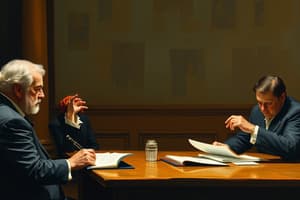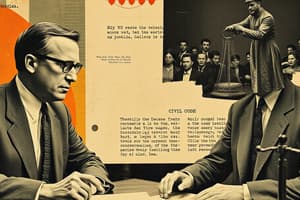Podcast
Questions and Answers
Which type of information can experts utilize to form their opinions?
Which type of information can experts utilize to form their opinions?
- Only facts that are admissible in court.
- Opinions from non-experts in the same field.
- Information independently verified by both the expert and the court.
- First-hand observations, second-hand information, and facts made known to them outside of court. (correct)
What is the primary distinction of an expert witness in a trial?
What is the primary distinction of an expert witness in a trial?
- They must always disclose all underlying data to the jury.
- They can provide opinions on legal matters.
- They are the only type of witness allowed to sit in on the trial. (correct)
- Their testimony is always considered valid without question.
How are otherwise inadmissible facts treated when presented by an expert witness?
How are otherwise inadmissible facts treated when presented by an expert witness?
- They are considered admissible along with the expert's opinion.
- They can be admitted as evidence if the expert confirms them.
- They are still inadmissible but can aid in assessing the expert's reliability. (correct)
- They must be disclosed to the jury before the expert testifies.
What is a key responsibility of an expert during cross-examination regarding the basis of their opinion?
What is a key responsibility of an expert during cross-examination regarding the basis of their opinion?
What does the term 'presumption of exclusion' imply in the context of expert testimony?
What does the term 'presumption of exclusion' imply in the context of expert testimony?
What is a requirement imposed by Rule 701(a) regarding witness testimony?
What is a requirement imposed by Rule 701(a) regarding witness testimony?
Which of the following statements about the reliance on second-hand information by experts is correct?
Which of the following statements about the reliance on second-hand information by experts is correct?
Which scenario describes testimony that would likely be inadmissible under Rule 701?
Which scenario describes testimony that would likely be inadmissible under Rule 701?
What distinguishes lay testimony from expert testimony according to the content provided?
What distinguishes lay testimony from expert testimony according to the content provided?
According to expert guidelines, which option defines the concept of 'Causal connection'?
According to expert guidelines, which option defines the concept of 'Causal connection'?
Which of the following statements about Rule 701(b) is correct?
Which of the following statements about Rule 701(b) is correct?
Why might experts not need to disclose the facts that inform their opinions initially?
Why might experts not need to disclose the facts that inform their opinions initially?
Which testimony would require specialized knowledge, thus likely making it inadmissible for a lay witness?
Which testimony would require specialized knowledge, thus likely making it inadmissible for a lay witness?
Why is the witness statement 'Everyone knows he killed her, as I always said he would' considered inadmissible?
Why is the witness statement 'Everyone knows he killed her, as I always said he would' considered inadmissible?
In regard to witness testimony, what is the main problem with a statement that says 'the substance looked like blood'?
In regard to witness testimony, what is the main problem with a statement that says 'the substance looked like blood'?
What is the implication of Rule 702 concerning expert witness testimony?
What is the implication of Rule 702 concerning expert witness testimony?
What does the Fifth Amendment protect an accused individual from in relation to their silence post-arrest?
What does the Fifth Amendment protect an accused individual from in relation to their silence post-arrest?
Under rule 801(d)(2)(C), which of the following individuals is typically authorized to make statements on behalf of a party?
Under rule 801(d)(2)(C), which of the following individuals is typically authorized to make statements on behalf of a party?
Which of the following is NOT a requirement for a statement to be admissible under 801(d)(2)(D)?
Which of the following is NOT a requirement for a statement to be admissible under 801(d)(2)(D)?
In the example given regarding the resort, why is the statement made by the accounting department employee not admissible against the company?
In the example given regarding the resort, why is the statement made by the accounting department employee not admissible against the company?
What is a key difference between 801(d)(2)(C) and 801(d)(2)(D)?
What is a key difference between 801(d)(2)(C) and 801(d)(2)(D)?
Which situation illustrates a statement that could be admitted under 801(d)(2)(D)?
Which situation illustrates a statement that could be admitted under 801(d)(2)(D)?
What is required for pre-arrest silence to be admissible in a court case?
What is required for pre-arrest silence to be admissible in a court case?
In the context of admissibility of statements, what key aspect is not relevant according to 801(d)(2)(D)?
In the context of admissibility of statements, what key aspect is not relevant according to 801(d)(2)(D)?
Which of the following is a requirement for a statement to be considered a statement against interest under rule 804(b)(3)?
Which of the following is a requirement for a statement to be considered a statement against interest under rule 804(b)(3)?
Which situation does NOT qualify as a statement against interest?
Which situation does NOT qualify as a statement against interest?
Which of the following indicates the special requirement for corroboration in statements against interest?
Which of the following indicates the special requirement for corroboration in statements against interest?
In which context can statements made by the declarant to police NOT be fully admitted as statements against interest?
In which context can statements made by the declarant to police NOT be fully admitted as statements against interest?
Which of the following statements best reflects the assumption underlying the rule of statements against interest?
Which of the following statements best reflects the assumption underlying the rule of statements against interest?
Which of the following is a reason why a statement made while in custody might not qualify as a statement against interest?
Which of the following is a reason why a statement made while in custody might not qualify as a statement against interest?
What is the consequence if a statement tends to subject the declarant to civil liability?
What is the consequence if a statement tends to subject the declarant to civil liability?
Which of the following does NOT count as losing interest according to the criteria for a statement against interest?
Which of the following does NOT count as losing interest according to the criteria for a statement against interest?
Which of the following statements accurately describes the requirements for a document to qualify as a business record under Rule 803(6)?
Which of the following statements accurately describes the requirements for a document to qualify as a business record under Rule 803(6)?
Which of the following would NOT qualify as a business record under Rule 803(6)?
Which of the following would NOT qualify as a business record under Rule 803(6)?
What is the key difference between the requirements for business records under Rule 803(6) and public records under Rule 803(8)?
What is the key difference between the requirements for business records under Rule 803(6) and public records under Rule 803(8)?
Which type of documentation would be considered admissible as a public record under Rule 803(8)?
Which type of documentation would be considered admissible as a public record under Rule 803(8)?
What is required for a document to be authenticated as a business record under FRE 901?
What is required for a document to be authenticated as a business record under FRE 901?
Which of the following conditions does NOT need to be met for a business record to be considered valid under Rule 803(6)?
Which of the following conditions does NOT need to be met for a business record to be considered valid under Rule 803(6)?
Which example of a report would be classified under the exception for hearsay as a public record?
Which example of a report would be classified under the exception for hearsay as a public record?
Which of the following most accurately describes the regularity requirement for business records?
Which of the following most accurately describes the regularity requirement for business records?
What can the absence of a public record demonstrate in legal proceedings?
What can the absence of a public record demonstrate in legal proceedings?
Which type of record is explicitly mentioned as an exception that can contain personal or family history?
Which type of record is explicitly mentioned as an exception that can contain personal or family history?
What type of document preserves statements about personal or family history?
What type of document preserves statements about personal or family history?
Which of the following records can affect an interest in property?
Which of the following records can affect an interest in property?
What is necessary for a statement in an ancient document to be admissible?
What is necessary for a statement in an ancient document to be admissible?
Which of the following statements regarding the search for public records is correct?
Which of the following statements regarding the search for public records is correct?
What type of report is explicitly mentioned for exemption from the rule against hearsay?
What type of report is explicitly mentioned for exemption from the rule against hearsay?
Under which rule can the absence of specific records from a public school board's meeting indicate that no meeting occurred?
Under which rule can the absence of specific records from a public school board's meeting indicate that no meeting occurred?
Flashcards
Lay Witness Testimony (Rule 701)
Lay Witness Testimony (Rule 701)
Testimony from a witness who describes something based on their firsthand observations, using common understanding and not specialized knowledge.
First-hand Knowledge (701)
First-hand Knowledge (701)
A requirement for lay witness testimony; the witness must have directly perceived the event or thing they are describing.
Opinion vs. Fact (Lay Witness)
Opinion vs. Fact (Lay Witness)
Lay witnesses can offer opinions based on their observations, but opinions should be grounded in factual observations and not speculation.
Inferences in Lay Testimony
Inferences in Lay Testimony
Signup and view all the flashcards
Expert Testimony (vs. Lay)
Expert Testimony (vs. Lay)
Signup and view all the flashcards
Inappropriate Lay Opinion (Example)
Inappropriate Lay Opinion (Example)
Signup and view all the flashcards
Inappropriate Lay Opinion (Example)
Inappropriate Lay Opinion (Example)
Signup and view all the flashcards
Inappropriate Lay Opinion (Example)
Inappropriate Lay Opinion (Example)
Signup and view all the flashcards
Expert Opinion Basis
Expert Opinion Basis
Signup and view all the flashcards
First-hand observations
First-hand observations
Signup and view all the flashcards
Second-hand information
Second-hand information
Signup and view all the flashcards
Reasonable Reliance
Reasonable Reliance
Signup and view all the flashcards
Expert witness
Expert witness
Signup and view all the flashcards
Rule 703
Rule 703
Signup and view all the flashcards
Hearsay (in expert context)
Hearsay (in expert context)
Signup and view all the flashcards
Reverse 403 Test
Reverse 403 Test
Signup and view all the flashcards
Silence after invoking the Fifth Amendment
Silence after invoking the Fifth Amendment
Signup and view all the flashcards
801(d)(2)(C) - Authorized Statement
801(d)(2)(C) - Authorized Statement
Signup and view all the flashcards
Authorized Speaker Examples
Authorized Speaker Examples
Signup and view all the flashcards
Unauthorized Speaker Example
Unauthorized Speaker Example
Signup and view all the flashcards
801(d)(2)(D) - Agent/Employee Statement
801(d)(2)(D) - Agent/Employee Statement
Signup and view all the flashcards
Scope of Employment
Scope of Employment
Signup and view all the flashcards
Statement Location Doesn't Matter
Statement Location Doesn't Matter
Signup and view all the flashcards
Statement by employee of Accounting Department, Ice Removal
Statement by employee of Accounting Department, Ice Removal
Signup and view all the flashcards
Business Record Exception
Business Record Exception
Signup and view all the flashcards
Requirements for Business Record
Requirements for Business Record
Signup and view all the flashcards
Example: Business Record
Example: Business Record
Signup and view all the flashcards
Authenticating Business Records
Authenticating Business Records
Signup and view all the flashcards
Public Records Exception
Public Records Exception
Signup and view all the flashcards
Differences: Public vs. Business Records
Differences: Public vs. Business Records
Signup and view all the flashcards
Examples: Public Records
Examples: Public Records
Signup and view all the flashcards
Public Records: 'Office's Activities'
Public Records: 'Office's Activities'
Signup and view all the flashcards
Statement Against Interest (804(b)(3))
Statement Against Interest (804(b)(3))
Signup and view all the flashcards
Pecuniary or Proprietary Interest
Pecuniary or Proprietary Interest
Signup and view all the flashcards
Reasonable Person's Belief
Reasonable Person's Belief
Signup and view all the flashcards
Corroboration for Incriminating Statements (804(b)(3))
Corroboration for Incriminating Statements (804(b)(3))
Signup and view all the flashcards
Against Interest Must Be Clear and Immediate
Against Interest Must Be Clear and Immediate
Signup and view all the flashcards
Statements Made in Custody
Statements Made in Custody
Signup and view all the flashcards
Statement Against Interest vs. Inculpatory Statement (Williamson v. United States)
Statement Against Interest vs. Inculpatory Statement (Williamson v. United States)
Signup and view all the flashcards
804(b)(3): No Admission of Non-Incriminating Remarks
804(b)(3): No Admission of Non-Incriminating Remarks
Signup and view all the flashcards
Absence of Record (Rule 803(10))
Absence of Record (Rule 803(10))
Signup and view all the flashcards
Public Record (Rule 803(10))
Public Record (Rule 803(10))
Signup and view all the flashcards
Diligent Search (Rule 803(10))
Diligent Search (Rule 803(10))
Signup and view all the flashcards
Rule 803(11)-803(23) (Exceptions to Hearsay)
Rule 803(11)-803(23) (Exceptions to Hearsay)
Signup and view all the flashcards
Religious Records (Rule 803(11))
Religious Records (Rule 803(11))
Signup and view all the flashcards
Certificates of Marriage/Baptism (Rule 803(12))
Certificates of Marriage/Baptism (Rule 803(12))
Signup and view all the flashcards
Family Records (Rule 803(13))
Family Records (Rule 803(13))
Signup and view all the flashcards
Records of Property Interest (Rule 803(14))
Records of Property Interest (Rule 803(14))
Signup and view all the flashcards
Study Notes
Evidence Outline
-
Rule 104. Preliminary Questions: The court decides if a witness is qualified, a privilege exists, or evidence is admissible. The court isn't bound by evidence rules, except for privilege rules.
-
Relevance That Depends on a Fact: When evidence's relevance depends on a fact, sufficient proof must exist that the fact does, in fact, exist. The court can admit the evidence, conditional on later proof.
-
Conditional Evidence: Foundational evidence can enter before or after the main evidence. The evidence is admitted contingent on the foundational evidence's later introduction. If the foundation is missing, the jury is instructed to disregard.
-
Rule 105. Limiting Evidence: If evidence is admissible for one purpose but not another, the court must limit its use accordingly.
-
Rule 401. Test for Relevant Evidence: Evidence is relevant if it has any tendency to make a fact more or less probable than without it, if the fact is of consequence in determining the action.
-
Probative Value: Evidence must have some tendency to make a fact more or less probable.
-
Materiality: The fact in question must be important to the case's outcome.
-
Rule 402. General Admissibility of Relevant Evidence: All relevant evidence is admissible (unless a specific rule or the Constitution dictates otherwise).
-
Rule 403. Excluding Relevant Evidence: Relevant evidence may be excluded if its probative value is substantially outweighed by the danger of unfair prejudice, confusing the issues, misleading the jury, undue delay, wasting time, or needlessly presenting cumulative evidence.
-
Rule 407. Subsequent Remedial Measures: Evidence of subsequent remedial measures isn't admissible to prove negligence, culpable conduct, a defect, or a need for a warning. However, it can be admitted for other purposes like ownership or feasibility of precautions.
-
Rule 408. Compromise Offers and Negotiations: Evidence of compromise offers or negotiations about a disputed claim isn't allowed to prove or disprove the validity or amount of that claim, or to impeach. Exceptions exist, such as in proving bias, undue delay, or obstruction of a criminal investigation.
-
Rule 409. Offers to Pay Medical and Similar Expenses: Evidence of offers to pay medical expenses isn't admissible to prove liability for an injury. However, statements made at the time of the offer are admissible.
-
Rule 410. Pleas, Plea Discussions, and Related Statements: Evidence of guilty pleas that are later withdrawn, nolo contendere pleas, and statements made during plea discussions isn't admissible in a civil or criminal case.
-
Rule 411. Liability Insurance: Evidence that a person was or was not insured against liability isn't admissible to prove negligence or wrongdoing, but it can be admitted for other purposes, like proving agency.
-
Rule 601. Competency to Testify: Every person is competent to be a witness unless these rules provide otherwise; This means certain restrictions, such as religious belief, have been removed from trial.
-
Rule 602. Need for Personal Knowledge: A witness can only testify if they have personal knowledge of the facts.
-
Rule 701. Opinion Testimony by Lay Witnesses: Lay witnesses can give opinions if they're rationally based on their perceptions, helpful for understanding their testimony, and don't rely on special knowledge.
-
Rule 702. Testimony by Expert Witnesses: Experts can give opinions or otherwise testify if their specialized knowledge will help the jury understand the evidence, their testimony is based on sufficient facts and data, it's the product of reliable principles and methods, and the expert reliably applied these methods.
-
Rule 703. Bases of an Expert's Opinion Testimony: Experts can base their opinions on facts or data they've observed or been made aware of. If experts in the field reasonably rely on such information, it doesn't need to be admissible.
-
Rule 704. Opinion on an Ultimate Issue: An expert opinion isn't objectionable just because it addresses an ultimate issue. Exceptions exist in a criminal case where an expert may not provide an opinion about a defendant's mental state required as an element of the crime.
-
Rule 705. Disclosing the Facts or Data Underlying an Expert's Opinion: Experts can state their opinions and reasons, skipping testimony regarding the underlying facts/data unless the court orders otherwise during cross-examination.
-
Rule 801. Definitions That Apply to This Article; Exclusions from Hearsay: Defines key terms like "statement" and "declarant." Further defines what is not hearsay.
-
Rule 802. The Rule Against Hearsay: Hearsay is generally not admissible.
-
Rule 803. Exceptions to the Rule Against Hearsay - Regardless of Witness Availability: Provides multiple exceptions to the hearsay rule. These allow certain types of out-of-court statements for consideration in court, even if the declarant is available to testify.
-
Rule 804. Hearsay Exceptions - Declarant Unavailable: Provides additional hearsay exceptions when the declarant is unavailable to testify. It includes exceptions for prior testimony, statements against interest, etc.
-
Rule 805. Hearsay Within Hearsay: If a statement contains hearsay within hearsay, each part of the statement must conform to an exception to the hearsay rule.
-
Rule 803(6). Records of a Regularly Conducted Activity: A record of a business's regularly conducted activity is admissible if made at or near the time of the event/condition, by or from information transmitted by someone with knowledge; kept in the course of the business activity, and making the record was a regular practice of the activity; with no untrustworthy sources or methods.
-
Rule 803(8). Public Records: Records of public offices regarding activities, matters observed while subject to a legal duty to report, and factual findings from authorized investigations are admissible unless sources or methods show a lack of trustworthiness.
-
Rule 803(7). Absence of a Record of a Regularly Conducted Activity: Evidence that a matter isn't included in a record of a regularly conducted activity, if both a record was regularly kept and there's no indication of untrustworthiness.
-
Rule 803(10). Absence of a Public Record: Evidence that a search of public records failed to find a record or statement, or that a matter didn't occur if a public office regularly keeps records relevant to the matter.
-
Rule 803(11). Records of Religious Organizations, Certificates, Family Records: Various admissible records based on religious organizations, certificates, and family records.
-
Rule 404. Character Evidence: Character evidence is generally inadmissible to prove that a person acted in a certain way on a specific occasion. However, there are exceptions.
-
Rule 412. Rape Shield Law: In cases involving sexual assault, there are restrictions on admitting evidence about the victim's prior sexual behavior.
-
Rule 413-415. Similar Acts in Sex Crimes: In cases of sexual assault and child molestation, other acts of similar offenses by the defendant are considered relevant.
-
Rule 607. Who May Impeach a Witness: Any party can attack a witness's credibility.
-
Rule 608. A Witness's Character for Truthfulness or Untruthfulness: A witness's truthfulness can be impeached, either through reputation/opinion testimony or specific instances of conduct (but extrinsic evidence is prohibited in the latter).
-
Rule 609. Impeachment by Evidence of a Criminal Conviction: Describes rules for using criminal convictions to impeach witnesses. A distinction is made between convictions that require a balancing test vs those that don't.
-
Rule 612. Writing Used to Refresh a Witness's Memory: A witness can use a document to refresh their memory and be questioned about it. An adverse party has rights regarding production of the document.
-
Rule 613. Witness's Prior Statement: A prior statement inconsistent with current testimony is admissible only to impeach, not to prove the truth of its contents.
-
Rule 803(1)-(5): Various Exceptions to the Hearsay Rule that don't require the speaker to be unavailable to testify: Offers many exceptions for when a statement is considered non-hearsay because of the specific circumstances under which the statement was made.
-
Rule 803(3). Statement of Then Existing Condition: A person's truthful statement of their mental, emotional, or physical state at a time is admissible.
Studying That Suits You
Use AI to generate personalized quizzes and flashcards to suit your learning preferences.




